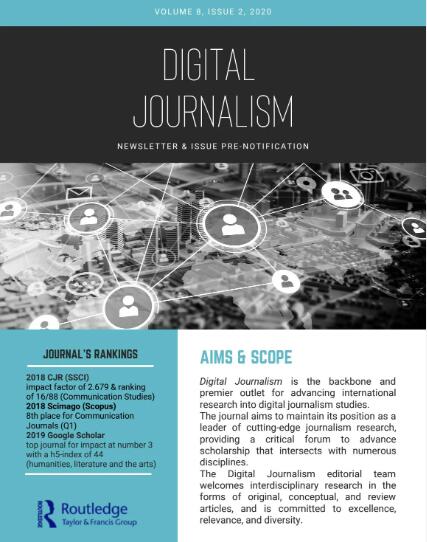撒哈拉以南非洲的人工智能、新闻业和 Ubuntu 机器人:建立规范性框架
IF 5.4
1区 文学
Q1 COMMUNICATION
引用次数: 0
摘要
本研究调查了撒哈拉以南非洲将乌班图哲学融入人工智能驱动的新闻实践的情况。重点关注其挑战、机遇和对新闻业的影响。本文章由计算机程序翻译,如有差异,请以英文原文为准。
Artificial Intelligence, Journalism, and the Ubuntu Robot in Sub-Saharan Africa: Towards a Normative Framework
This study investigates the integration of Ubuntu philosophy into AI-driven journalism practices in Subs-Saharan Africa. With a particular focus on its challenges, opportunities, and implications f...
求助全文
通过发布文献求助,成功后即可免费获取论文全文。
去求助
来源期刊

Digital Journalism
COMMUNICATION-
CiteScore
11.20
自引率
24.10%
发文量
103
期刊介绍:
Digital Journalism provides a critical forum for scholarly discussion, analysis and responses to the wide ranging implications of digital technologies, along with economic, political and cultural developments, for the practice and study of journalism. Radical shifts in journalism are changing every aspect of the production, content and reception of news; and at a dramatic pace which has transformed ‘new media’ into ‘legacy media’ in barely a decade. These crucial changes challenge traditional assumptions in journalism practice, scholarship and education, make definitional boundaries fluid and require reassessment of even the most fundamental questions such as "What is journalism?" and "Who is a journalist?" Digital Journalism pursues a significant and exciting editorial agenda including: Digital media and the future of journalism; Social media as sources and drivers of news; The changing ‘places’ and ‘spaces’ of news production and consumption in the context of digital media; News on the move and mobile telephony; The personalisation of news; Business models for funding digital journalism in the digital economy; Developments in data journalism and data visualisation; New research methods to analyse and explore digital journalism; Hyperlocalism and new understandings of community journalism; Changing relationships between journalists, sources and audiences; Citizen and participatory journalism; Machine written news and the automation of journalism; The history and evolution of online journalism; Changing journalism ethics in a digital setting; New challenges and directions for journalism education and training; Digital journalism, protest and democracy; Journalists’ changing role perceptions; Wikileaks and novel forms of investigative journalism.
 求助内容:
求助内容: 应助结果提醒方式:
应助结果提醒方式:


